#olodumare
Photo

genesis // prints // my patreon
100 notes
·
View notes
Text
DO IFA DEVOTEES BELIEVE IN GOD?

Since all non-Abrahamic traditions have been relegated to pagan status, I get this question quite often about the Ifa tradition. Many people assume that we are devil-worshipping, sadistic heathens for the most part. And this could be further from the truth. Ifa devotees absolutely believe in God, or what many refer to as the Creator Being, Supreme Creator, Almighty, etc. In fact, the modern-day concept of god in Abrahamic religions was derived from African traditional beliefs.
As such, Ifa traditionalists have shared a long history of the belief in a Sovereign Creator. However, we likewise believe in and reverence other spiritual forces created by the Supreme Being. And herein lies most of the confusion. Much of our visible worship or veneration practices are devoted to deities or Orishas, spirits, and ancestors. This is seen in our sacrifices, offerings, and ritual work.
Contrarily, the same type of homage is not paid to Olodomare, the Creator God of the Ifa tradition. Though, this spirit is duly honored and reverenced in all we do. And we believe that this force made all other living beings.
DEFINITION OF GOD
Before we can truly qualify the notion of god according to the Ifa belief, we must first understand what “god” means. The definition of God is a complex concept that has been debated and discussed by many cultures throughout history. While there is no universal definition of God, most definitions focus on the idea of an all-powerful, all-knowing, and all-loving being that created the universe.
In religious contexts, God often has additional attributes such as omniscience, omnipresence, and omnipotence. Many also believe that God is a personal being who interacts with humanity in some way. And many of these attributes apply to the nature and character of Olodumare or the Almighty in the Ifa tradition.
THE GOD OF IFA TRADITION
Olodumare is an ancient Yoruba deity believed to be the Supreme God and Creator of the universe. Olodumare is responsible for bringing order and balance to the world, as well as providing guidance and protection to its people. This Energy is the source and force of all that exists on Earth.
Originally, this entity was thought to be genderless, and in some instances, it was considered feminine. However, due to Christian and patriarchal corruptions, Olodumare is often assigned masculine attributes. For the sake of argument, I refer to this Being as a genderless entity. However, I believe that this deity embodies both masculine and feminine traits.
Olodumare is often referred to as “The All Sufficient” due to its role as the highest power in the Yoruba religion. In addition, it is said that Olodumare has a special connection with humanity, offering us divine wisdom and understanding.
However, Olodumare is not thought to be interactive in our day-to-day lives as our personal deities. Instead, this Supreme Power is effectively present in every aspect of the spiritual and physical worlds. And this Power has given dominion to other spiritual forces to protect and guard the Earth and the astral realm.
THE TRINITY MANIFESTATION
It can be said that Olodumare shares a trinity manifestation similar to the Supreme Being in other African religions. Likewise, we see this notion in contemporary Christian belief systems. Though this Energy is one force, it manifests in three forms – Olodumare, Olorun, and Olofi.
Olodumare is the Creator of all existence, Olorun is the ruler of the heavens, and Olofi acts as a conduit between Orún (Heaven) and Ayé (Earth). Together, these three forms represent a powerful and complex pantheon with an ancient history rooted in culture and tradition. Though in many instances, Ifa devotees commonly refer to this Spirit as Olodumare.
WORSHIPPING THE SUPREME CREATOR
In contrast to the Orishas, Olodumare is primarily worshipped through thanks and praise. There are no dedicated shrines or places of worship for this force. Nor do we give sacrifices and offerings to Olodumare as this Spirit is the Creator of All.
Some feel that Olodumare is not concerned with the daily affairs of man. So, these individuals primarily focus on the Orishas and ancestral spirits. However, others pay direct homage to Oludumare and commonly reference this Spirit in prayers and incantations. In either case, Ifa devotees acknowledge the existence of a Supreme Force that created all.
#ifa religion#ifa tradition#orisa#orishas#olodumare#african spirituality#african traditional religions#traditional african religions#african spirit
6 notes
·
View notes
Text
I Give thanks and praise to the Orishas
With them as my protectors and guides
How can I ever be lost
Ashe
#Orishas#Yoruba#Ifa#Rootwork#Santeria#Hoodoo#voodoo#Vodou#400+1#Ellegua#Obatala#Yemaya#Shango#Orunmilla#Oya#Ogun#Babaluaye#Olodumare#Oshun#Ashe#African powers#Enlightenment#Peaceful#Tranquility#Spirituality#Protectors#African religion#Mexico#Cuba#Brazil
16 notes
·
View notes
Photo

LONG POST ALERT A body of work over a year in the making. Broken into 3 "Acts" with an "Epilogue" section located in the rear of the gallery, this collection of works is a visual metaphor for the journey of the Black American, from pre-colonial times to contemporary times to a futurist Afro-topia. This is not simply about Blacks in space (although it is that too). This is about using culture and history to imagine an unseen and prosperous future. Imagining how the future looks provides mental armor for the now. This show is about adaptation and change in the face of danger. Our imagination is what makes us human. Slavery made us aliens, but my antennae are coming in nicely. This show has taken a lot to think about and to make, and I hope you can come to experience it. I have a hard time believing I myself put this much work into an idea. Featuring @dji75mike Also, I'll be playing music that reflects the vibe of the journey. Yes, I'll be playing music. Thank you for joining me on this Black Pop journey, but now, it is time to pivot. Pivot with me, through time and space. @cecretbycegallery 516 Houston St. Nashville Opening reception: THIS SATURDAY AUGUST 6 6-9pm (Space Emoji) #afrofuturism #oshun #shango #olodumare #oya #yemeya #olokun #ogun #yoruba (at Houston Station) https://www.instagram.com/p/Cg0i7JwOFwR/?igshid=NGJjMDIxMWI=
15 notes
·
View notes
Text
Deliverance Prayer Against Ancestral African Witchcraft Pray Out Loud
Father,
Please help me.
I thank Your only-begotten Son Jesus Christ for making Your help available to me through His glorious sacrifice. I thank you for sending us the Holy Spirit in the Holy name of your Son Jesus Christ. I thank you, Holy Spirit, for the work you are doing in this world and in my life. Thank you God, thank you Father, thank you Jesus, thank you Holy Spirit.
Please lead me into…
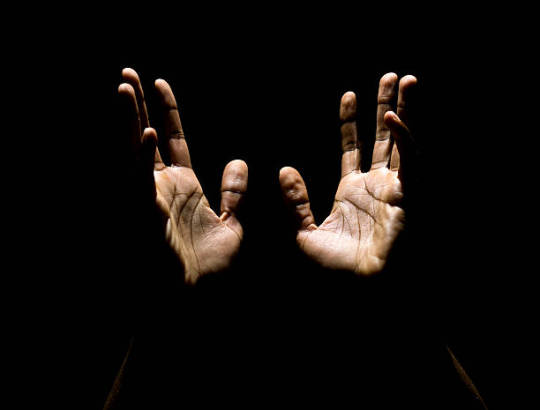
View On WordPress
#african gods#African spirituality#Candomble#chango#channelers#deliverance prayer#ifa#juju#loas#Macumba#mediums#obeah#ogun#Olodumare#oshosi#Oshun#Palo#Papa Legba#pray#prayer#santeria#shamans#Umbanda#voodoo#Witchcraft#Yemmaya
2 notes
·
View notes
Text
OLODUMARE - Pastor Anthony Ebong
OLODUMARE – Pastor Anthony Ebong
Gospel music minister and songwriter, Pastor Anthony Ebong drops a brand new single “titled OLODUMARE”, giving the sense of the LORD is “greatly majestic” or “extremely glorious.” The idea conveyed is that He is incomparable in light of His marvelous deliverance of His people.
Psalm 96:1-6 said it all For the LORD is great and greatly to be praised; He is to be feared above all gods. For all the…

View On WordPress
0 notes
Text
"Rule With Fear Of Olodumare', Araba Of Ibadanland Tells New President, Other Elected Political Office Holders
The Araba of Ibadanland and Oluisese of Oyo State, Chief Ifálérè Odegbemi Odegbola II has urged the President, Bola Tinubu, Seyi Makinde and other elected political office holders in the country to rule with fear of Olodumare.
Araba stated this while speaking with journalists at this year’s annual Ifa and Orisa festival organised by Odegbola Traditional Global Services, Ibadan.
The Araba of…
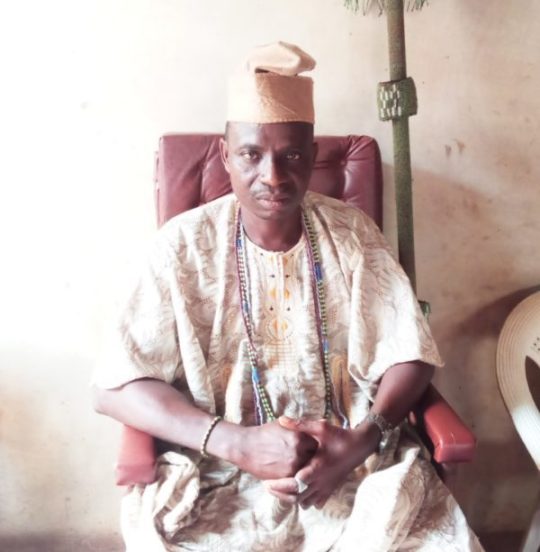
View On WordPress
1 note
·
View note
Text
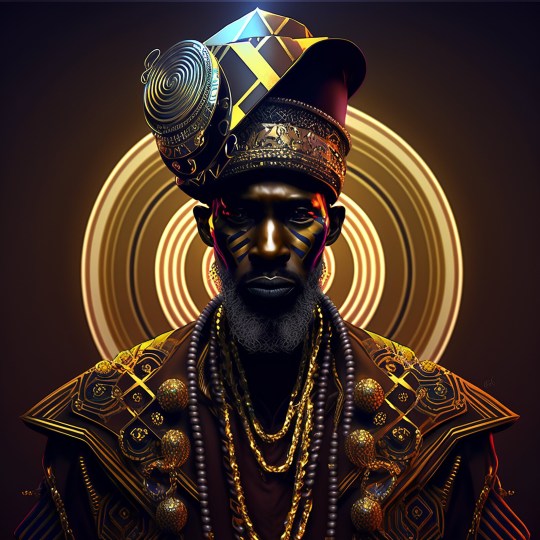
Babaaláwo or Babalawo in West Africa (Babalao in Caribbean and South American Spanish and Babalaô in Brazilian Portuguese) literally means "father of secrets" in the Yoruba language. It is a spiritual title that denotes a high priest of the Ifáoracle. Ifá is a divination system that represents the teachings of the ÒrìṣàỌrunmila, the Òrìṣà of Wisdom, who in turn serves as the oracular representative of Olodumare.
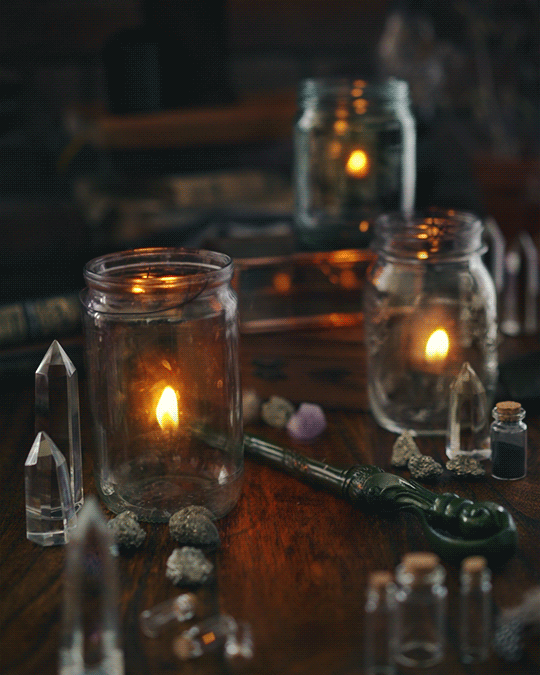
Functions in society
The Babalawos are believed to ascertain the future of their clients through communication with Ifá. This is done through the interpretation of either the patterns of the divining chain known as Opele, or the sacred palm nuts called Ikin, on the traditionally wooden divination tray called Opon Ifá.

In addition to this, some of them also perform divination services on behalf of the kings and paramount chiefs of the Yoruba people. These figures, holders of chieftaincy titles like Araba and Oluwo Ifa in their own right, are members of the recognised aristocracies of the various Yoruba traditional states.
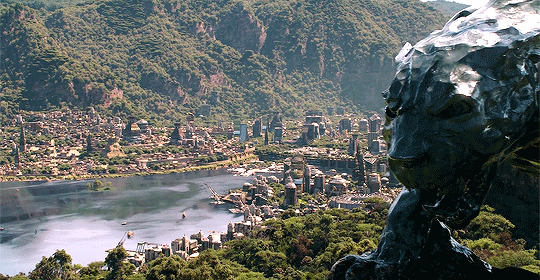
People can visit Babalawos for spiritual consultations, which is known as Dafa. The religious system as a whole has been recognized by UNESCO as a “Masterpiece of the Oral and Intangible Heritage of Humanity."
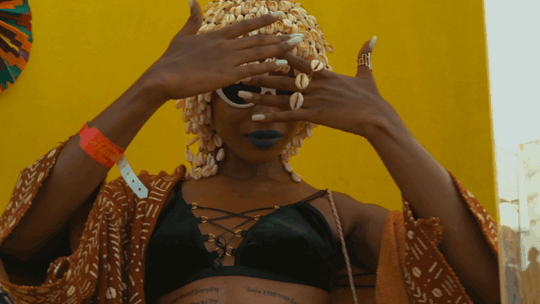
#unesco#babalawo#dafa#yoruba#african#afrakan#africans#brownskin#afrakans#kemetic dreams#brown skin#african culture#afrakan spirituality#nigerian#ancestors#peace#metaphysics#araba#opele#ifa#ouwa#olodumare#orisa#orunmilla#orun#traditional african religion#west africa#yoruba language#father of wisdom#orisa of wisdom
107 notes
·
View notes
Text

Olorun from Yoruba mythology.
In Yoruba culture, Ọlọrun is credited with creating the universe and all living things. Ọlọrun is frequently perceived as a compassionate entity that protects its creations and is thought to be omnipotent, omniscient, and omnipresent. Humans do not worship Olorun directly; there are no sacred areas of worship, no iconography, or ordained person. Olorun is outlying, distant, and does not partake in human rituals.
Olorun has no gender and is always referred to as an entity that exists in spiritual form only.
Historically, the Yoruba worship Olorun through the agency of the orisa; thus, there is no image, shrine, or sacrifice made directly towards Olorun. However, there are those who also worship Olodumare directly. Olodumare is the origin of virtue and mortality and bestows the knowledge of things upon all persons when they are born. They are omnipotent, transcendent, unique, all-knowing, good, and evil. The Yoruba call on Olodumare when other deities (orishas) seem unwilling or incapable to help. These orisa or orishas are supernatural beings, both good (egungun) and bad (ajogun), who represent human activity and natural forces. Yoruba people believe Olodumare created all other forces of the universe to help continue the evolution of the universe.
Follow @mecthology for more myths and legends.
Pic: SMITE WIKI.
Source: Wikipedia.
27 notes
·
View notes
Text

Oshosi Gets his Crown, 2019
Oil on Belgian linen
23 x 16"
Based on King Oedipus from Greek mythology, this painting depicts the hunter Oshosi who unwittingly killed one of his parents. Oshosi was given a quest to find and trap a rare bird as a gift for Olofi (also called Olodumare or Olorun). Upon completion, his mother thought the bird was for dinner and killed it. Oshosi found the dead bird and trapped another. Olofi was delighted crowning Oshosi and making him an orisha of contemplation, loving the arts and of beautiful things. In addition, Olofi granted Oshosi a wish; he asked for his arrow to kill the person who had killed the first bird. He let his arrow fly, and it pierced his mother's heart. Oshosi is often viewed as a model of justice but in Rosales’ painting he looks vulnerable expressing the costs of his actions.
ADA Museum
15 notes
·
View notes
Text
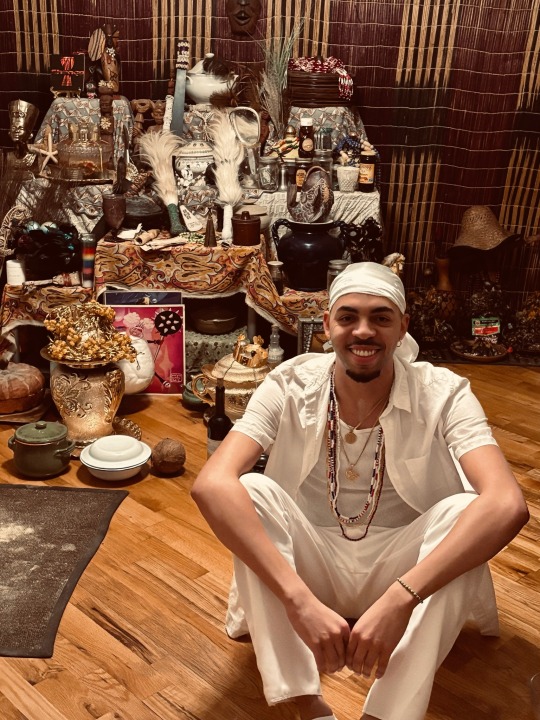
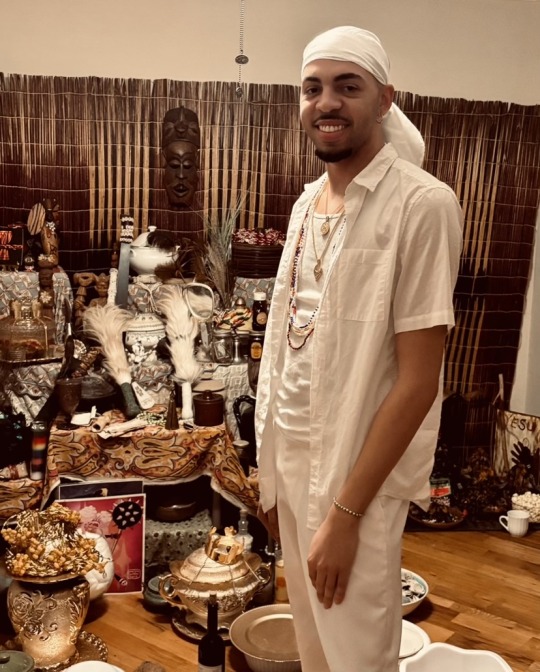
Mojuba Olodumare, Mojuba Egungun, Mojuba Orisha
10 notes
·
View notes
Text
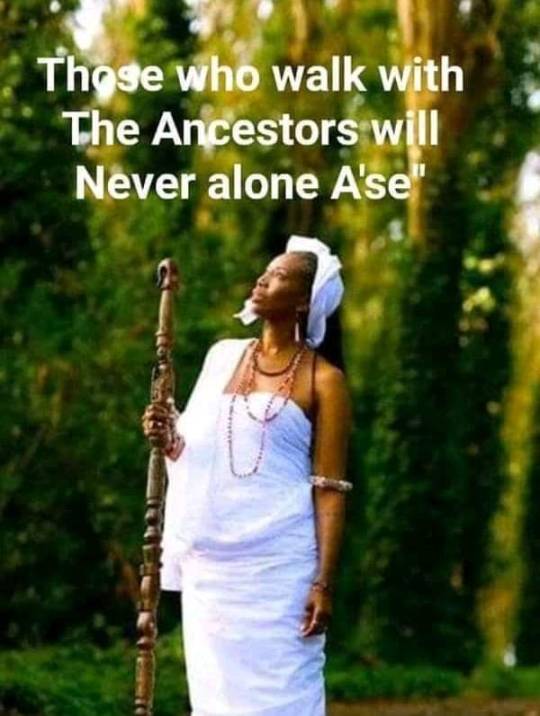
A spiritual person always keeps faith in the Spiritual world. Even when you have no hope, you should keep believing in Olodumare the Orishas and the ancestors and their wisdom. Never lose hope about anything in any situation, whatever it is bad or worst. Olodumare the Orishas and the ancestors talks to everyone all the time and their blessings are always with us. Prayers and spiritual words of wisdom are a great source of inspiration.
Spiritual messages can inspire someone to keep on when he or she has no hope.
The Spiritual world knows everything. They knows what is good for us. Whatever they are doing will be good for you. In our hard time, they gives us a chance to realize our mistakes, to improve ourselves. So never take a hard time as a punishment. It’s a blessing from them.
There will always come a time in man's life when you believe everything is finished. But that is just the beginning.
Life is really simple, but sometimes we insist on making it complicated.
Only through love can we obtain communion with Spiritual world, remember that the soul would have no rainbow if the eyes had no tears.
In conclusion, knows that character is not something that you buy, it is not a commodity that can be bartered for, it is not a quality suited for only the rich and famous, rather, character is built upon the foundational commitment of love, honesty, and compassion for others.
Ase'🙏👏🌻🌷
Grand Rising family!
35 notes
·
View notes
Text
ORISHAS IN THE IFA TRADITION
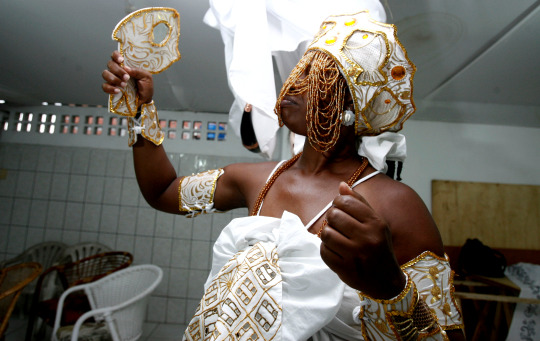
Orishas, also spelled Orisa, are natural forces or supernatural entities of the universe. These spirits are also referred to as deities or gods of the elements in the Ifa tradition of West Africa. They serve as conduits or intermediaries between humans and the Supreme Being (Olodumare) to benefit and help humans enjoy life.
There are innumerable Orishas in the Yoruba system and its derivatives. Some of the most popular Orishas are Orunmila, Eshu, Ogun, Obatala, Sango, Oya, and Yemoja. These spiritual forces embody elements of nature like the river, ocean, thunder, and wind. They are also linked to unique attributes such as wisdom, peace, love, health, and prosperity. Many people desire to connect with these beloved deities for these reasons and more.
COMMON ORISHA NAMES AND ATTRIBUTES
The following descriptions outline some of the major Orishas in the Ifa tradition and their attributes. Though keep in mind that these Orishas are revered in many traditions outside of Nigeria. And each society has its own beliefs surrounding the character and nature of these deities within their culture.
ORUNMILA
Orunmila is the Grand Priest of Ifa. He is the first Orisha to be reckoned with in the history of the Ifa tradition. Orunmila brought the wisdom of Olodumare (the Creator) to earth. The Yoruba people venerate Orunmila as a prophet of Ifa, the spirit of destiny, and Orisha of wisdom and knowledge.
ESHU
Eshu, also known as Esu or Elegba, is another prominent Orisha of the Ifa spiritual system. This deity understands all the languages spoken in the world and serves as a messenger between humans and the gods. As the harbinger of rewards and punishment, Eshu often instills a sense of fear or trepidation in some. He is known for his pranks, cruelty, unpredictability, and disruptions. Hence, he is often referred to as the ‘trickster god.’

Spirits of Africa Numerology Deck // Asanee 44
OGUN
Ogun is the elemental deity of iron, as he was a warrior during his sojourn on earth. He cleared the way for other Orishas to gain entrance to the planet using a metal ax and the help of a dog.
OSUN
Osun also spelled Oshun, is popularly referred to as the river goddess. Linked to purity, fruitfulness, fertility, calmness, and love, Oshun embraces the attributes of water. She also embodies human characteristics like jealousy, spite, and vanity.
OBATALA
Obatala is one of the most powerful and oldest Orisha in the Ifa religion. He is referred to as the king of white cloth as he is a tranquil judge. Greatly associated with forgiveness, honesty, peace, purity, and purpose, this Orisha is credited with the creation of humans.
SANGO
Sango or Shango governs the elements of thunder and lightning. He was once a king of the great Oyo Empire. And as such, Sango is one of the most revered Orishas in Yorubaland. The name Shango means to strike, and when annoyed, he brings thunder to burn the enemies or offenders of his children.
OYA
Oya is commonly known as the powerful goddess of storms. She comes before thunder in the form of lighting and is a favorite wife of Shango in some traditions. The name Oya means physical action or ‘she tore.’ Oya symbolically depicts the air that humans breathe as she can bring about life or death in the form of hurricanes, storms, or tornadoes.
YEMOJA
Yemoja is specifically a water spirit and is often depicted as a mermaid goddess. She is regarded as the mother of all the Orishas (deities) and the giver of life in the Ifa religion. She is believed to have originated from Tapa (Iganna) in the Oke Ogun area, Ogun State, Nigeria. Like Oshun, she is also known as a deity of fertility though her purview is the ocean rather than rivers. She protects sailors, dockworkers, fishers, swimmers, and others who travel by sea.
SUMMARY
As indicated, the Orishas in the Ifa tradition are innumerable. They are seen as the messengers of Olodumare, the Supreme Being. Each Orisha has its own distinct personality and set of characteristics that can be called upon to help guide an individual throughout life. Through offerings and rituals, individuals seek to honor and communicate with these powerful forces to receive guidance and direction.
As one grows in your knowledge and understanding of the tradition, one will encounter more and more Orishas. As such, one will grow and advance in knowledge about the character of these beings. And in turn, one can benefit from the many blessings and gifts of these sacred energies.
13 notes
·
View notes
Text
Um momento de conexão com Iemanjá
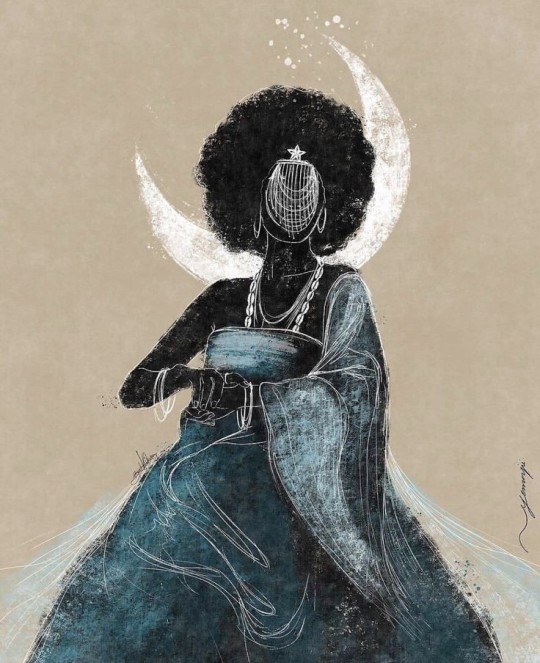
(Imagem retirada do pinterest, artista desconhecido, se alguém souber o nome do artista, comente para que eu possa dar os devidos créditos)
História de Iemanjá Sessu :
Logo no princípio do mundo,
Iemanjá ja teve motivos para desgostar da humanidade.
Pois desde cedo os homens e as mulheres jogavam no mar
Tudo o que a eles não servia.
Os seres humanos sujavam suas águas com lixo,
Com tudo o que não mais prestava, velho ou estragado.
Até mesmo cuspiam em Iemanjá,
Quando não fazia coisa muito pior.
Iemanjá foi queixar-se a Olodumare.
Assim não dava para continuar,
Iemanjá Sessu vivia suja,
Sua casa estava sempre cheia de porcarias.
Olodumare ouviu seus reclamos
E deu-lhe o dom de devolver à praia
Tudo o que os humanos jogassem de ruim em suas águas
Desde então as ondas surgiram no mar.
As ondas trazem para a terra o que não é do mar.
- Mitologia dos Orixás de Reginaldo Prandi
26 notes
·
View notes
Text
15 African Gods and Goddesses You Should Know - Myth Nerd
Africa is easily one of the most diverse and beautiful places on our planet, but it’s not exactly as popular as other tourist destinations around the world.
Whenever you think of “Africa”, you most likely think of lions, elephants, and the endless stretches of jungles, filled to the brim with venomous creatures that can’t be found anywhere else on this planet.
But while Africa does have an abundance of those elements, it also has a ton of beautifully diverse people and cultures that have lived amongst each other for thousands of years now.
As such, the more you look at it, the more interesting these African cultures get, as their religious beliefs are very different from ours. While ours are more so based around a unified belief in a supreme deity, theirs are a lot more closely related to the human life and their daily treads.
There are thousands upon thousands of cultures to explore here, to the point where you could actually spend your whole life researching everything that Africa has in store for you and you’d still fail to capture it in its entirety.
So, for today’s article we decided to bring you a quick rundown of 15 African Gods and Goddesses that are going to show you just how interesting this part of the world can really be.
But before we do that how about we give you a little introduction to African Mythology, starting off with:
How Many African Gods Are There?

The Pantheon of Orishas, a belief system that is mostly followed by the Yoruba people, is a group of divine spirits that was created by the supreme god Olodumare.
While there is no actual official number of gods that can be found in this pantheon though, there is an interesting notion around it which states that there are 400+1 Orishas around.
This is because that number is an incomprehensible number for the Yoruba people, which in turn implies that there are an infinite number of gods in this pantheon.
Some recollections tell us that there are as many as 700, 900 or even 1,440 Orishas around. The reason as to why there is a +1 Orisha in that list is because the +1 is meant to represent the extra one you didn’t account for, or the one that you never even considered in the first place.
As such, it is meant to represent that there will always be more Orishas than you think, and while you can try to count them one by one you will always fall short before reaching the final number.
Is Yoruba the Definitive African Religion?
There is no official African religion out there, and that is because there are countless cultures and practices that are spread all across the continent.
Instead, we can refer to the Yoruba religion as its most popular religion simply due to how widespread it is.
The Yoruba religion originated from Nigeria, where it starts off small but it soon picked up traction, becoming a faith where its followers can address the gods and goddesses through their complex oral traditions which they pass down from generation to generation.
Important Themes in African Mythology

By far the most important theme that we need to mention about the Yoruba religion is the idea of Animism. This simply refers to the fact that everything, and we do mean everything, possesses some sort of spiritual essence within it.
So, you should never disrespect anything because chances are, they are controlled by the Orishas and disrespecting them is akin to disrespecting the Orisha gods.
The second most important theme that we can attribute to the Yoruba religion and culture is the idea behind reincarnation. This belief has been with the Yoruba religion for many generations now, and it refers to the idea that deceased family members will be reborn as babies after their passing.
This is why you will often times find Yoruba people named after their departed parents or grandparents in case they look alike. If they share the same likeness, they will be called something like “Babatunde” which pretty much just translates to “father returns” or Yetunde” or “mother returns”.
Now that we are accustomed to the most popular religion in Africa, let’s just talk about the 15 Gods and Goddesses that we have in store for you today, starting off with:
1. Oshun
Interestingly enough, Oshun was actually not that popular in western media until a while ago, when Beyonce mentioned her in her Lemonade music video. That is when people started to do their research about the Goddess, shining light on this Yoruba deity for the first time in the states.
But who exactly is Oshun? Well, she is the Goddess of sweet and freshwaters. The reason for this is because she is most often times depicted admiring her own beauty in the water.
She is known for healing the sick with ease, fostering prosperity and better yet, for making infertile couples fertile.
Most of the times she is actually showcased as a beautiful and coquettish young lady, and her name specifically translates to sweetness, joy, beauty and good times.
2. Ajé Shaluga
Ajé Shaluga is the god that represents money and treasures. Most of the time they are depicted as both a male and a female orisha, and their followers are always thanking them for providing them with fair wages and plenty of work opportunities to keep their families fed and happy.
If you ever need a job as a Yoruba follower, you just need to pray to Ajé Shaluga and they will grant you your wishes. While this Orisha is not one of the most popular or powerful gods around, Ajé Shaluga still has a decent following due to them being associated with happiness, stability and spiritual wealth.
If you wish to give Ajé Shaluga an offering, all you need to do is you need to grab a handful of fresh fruit, pigeons, necklaces made out of coins and shells and flowers and you need to leave them at one of their altars.
3. Bumba
Also commonly referred to as Mbombo, Bumba is actually the creator god of the Kuba people from Central Africa.
It is said that Bumba vomited the universe during its inception, creating the sun then drying up the water on Earth creating the land. Bumba didn’t stop there though as he also vomited up the sun, the night and nine animals in total.
These nine animals are the original inhabitants of Earth, and out of several combinations came humanity.
Bumba himself however is represented as a giant white-colored humanoid creature. He is most often times showcased sick, since he did vomit up the Earth back in the day.
4. Eshu
The idea of having a trickster god may sound like something made up by the Nordics, but African cultures weren’t all that far off from this concept either since they had Eshu right around the corner.
Eshu, also commonly referred to as Elegba, is the Trickster god of the Pantheon. He is pretty much just a benevolent version of Loki, as he goes around not trying to stir up problems but instead just enjoying life, more so playing the role of a messenger between the realm of spirits and mankind.
If you do actually spot him and decide not to give him an offering, he is definitely going to play tricks on you, but for the most part he just wants to have fun and be left to his own whims instead.
He does require tobacco offerings though, but once you do receive his blessing you are pretty much set for life.
5. Ogun
Regardless of which mythology you look at, chances are that there is always a master of iron right around the corner, ready to bring the gods the weapons and armor that they don during the final days.
West Africa is anything but peaceful, as war can break out at any point between tribes, which is why steel is a more useful keeper of peace than words will ever be.
And when steel becomes your only means of protection, it isn’t too uncommon to find gods based around the armory for the warriors to pray to.
This is where Ogun comes in. He is known as the Giver of Iron or the Warrior God of War for many. He is the best weapon wielder in the Orisha. He is the one that protects the Yoruba people from dangers and more specifically, the one that helps bless their weapons before they set out for war.
6. Oya

Oya is by far one of the most ferocious and protective gods that the Yoruba pray to. She is often times referred to as the Goddess of wind, thunderbolt and fire, and she is by far the most feared goddess in the pantheon.
This isn’t to say that she mistreats her followers, quite the contrary actually, but it is something to keep in mind if you choose to pray to her.
Whenever she shows up, she is usually accompanied by her husband, Shango, the God of Storms. The two walk together as their thunderstorms destroy everything in sight.
7. Shango
While modern people look at the roar of the thunder and they don’t think much of it, back in ancient times, this thunder would have been a sign that the gods’ wrath was coming down from the heavens, punishing the pagans that took the gods’ name in vain.
This wrath was represented by Shango, the bringer of thunder, as he would showcase the true power of the Gods through his own wrath and fury.
He is also the god of masculinity and strength, with many people comparing him to the Greek God Zeus or the Norse God Thor.
He actually has three different wives, Oshun, Oya and Oba, and he is often times depicted with either one of them or all three being by his side.
8. Ala
Igbo is one of the oldest African religions around, with Ala being one of their oldest and most popular goddesses.
Her name literally translates to “Earth”, which is meant to indicate that she is the creator of our planet and the one that controls its every move.
She is the goddess of fertility, morality, creativity and land, and she is often times seen next to Amadioha, her husband and the God of the Sky.
She is actually often times honored and celebrated by the Igbo people, especially so during the yearly yam festival.
You should never take her name in vain as if you dare to disrespect her, she will convince her husband to stop the rain from coming down, causing the people to suffer tremendously because of it.
9. Oshun
We all know that no matter which religion you look into, chances are that they consider rivers to be a benevolent gift from the gods.
When it comes to the Yoruba people, Oshun is the one most commonly referred to as the Goddess of Rivers, but besides this she is also often times known as the Lifeblood of the Niger River and the mother of all rivers.
She is actually Shango’s favorite wife, and she is one of the most important Orishas that you need to know about in the Yoruba pantheon.
She is also often times associated with fertility and childbirth, and it is said that she is the one that gives mothers the ability to do everything in their power to protect their children from dangers.
10. Oduda
Oduda is the goddess of prostitution that is worshipped by the North-West African people. These are the Benin, Yoruba and Dahomey tribes, and despite the fact that prostitution is considered to be a taboo by most modern people, it is often times cited as a necessity by these tribes.
Her name translates to “The Black One”, and she is most often times showcased as a serpent. The reason as to why she is the goddess of prostitution is because that is the most common practice in the Caribbean Islands.
11. Obatala
Often times referred to as the “Child of God”, Obatala is known as the kindest god in the pantheon, even though they are seen a lot of the times next to their father, the powerful Olorun.
Interestingly enough, Obatala was never actually stated as being a male or a female god, they are pretty much androgynous.
It is said that Obatala was the one that created the human bodies, and as they finished up their job, they demanded of their father to breathe life into the soulless bodies in front of them.
Their androgynous trait is actually meant to represent fairness, forgiveness and compassion all at once. They were supposed to take care of the first men and women, but because they got distracted their brother Oduduwa decided to create the world instead for them to be safe in.
12. Yemaya
Yemaya is known as the Patron Spirit of the Ocean and the Rivers, and she is the main deity that the Yoruba people pray to when they set sail.
She is said to be motherly and strong willed, while also being very good at curing infertility in women. Whenever she does lose her temper though she causes the waters to be violent, attacking and taking down even the mightiest ships because of her sorrows.
13. Aja
Aja is actually the Goddess of the Forest and all of the animals that live within it. She is the one that brings the life over to the forests, and most often times she is depicted carrying around a basket with her.
This basket is full of potions and healing herbs, since she is also often times referred to as the Goddess of Botany.
She was the one that taught the Yoruba people how to create potions and heal through herbs alone, and whenever you do go hunting you need to give her an offering so she allows you to have a safe passage through her realm.
14. Obaluaye
While death is never considered to be the final frontier in most any African culture, that doesn’t mean that you should welcome death no matter what.
Being able to prevent death from happening simply means that it was not their time to go yet, and if you can do that you need to thank Obaluaye because they were the ones that gave you the answers you needed when you searched for a way to heal them.
This is because Obaluaye is the Master of Healing and by far one of the most popular Orisha in the Yoruba mythos.
He is the one that has the cure for any illness around and if you ever happen to grow sick and weary you need to pray to Obaluaye if you wish to be healed as soon as possible.
15. Kibuka
Kibuka is actually referred to as the God of War in the Buganda Empire kingdom. It goes as far back as the 9th century, way before the first Europeans set sail on the country’s shores.
It is said that after the Bugandan people were terrorized by a series of attacks, their king decided to have a meeting with Mukasa, the Creator of all things, to ask him how he can defeat his enemies.
His answer was simple and swift, he ordered his younger brother, Kibuka, to fight on their behalf as their God of War.
Because of this Kibuka pretty much managed to destroy everyone in his path, bringing victory to the Buganda Empire kingdom.
Conclusion

African mythology has hundreds if not thousands of other gods and goddesses that we have yet to mention in this article alone. While the Yoruba mythology is by far the most popular, we also recommend checking out some of the other religions here if you have the time for it.
That is because there are so many wondrous, crazy and fantastic stories that you can hear coming from the tribes here, stories that you won’t be able to find anywhere else around the globe.
While it is nowhere near as popular as the Norse or Greek mythologies, African mythology can be just as fun to research if you have the time and passion to do so.
At the same time, we can assure you that if you do end up doing your own homework, you’ll find more than a handful of customs and traditions that you yourself may start adoring just as much as we do.
Contents [hide]
How Many African Gods Are There?
Is Yoruba the Definitive African Religion?
Important Themes in African Mythology
1. Oshun
2. Ajé Shaluga
3. Bumba
4. Eshu
5. Ogun
6. Oya
7. Shango
8. Ala
9. Oshun
10. Oduda
11. Obatala
12. Yemaya
13. Aja
14. Obaluaye
15. Kibuka
3 notes
·
View notes
Text

Today as you rise to a new day and month, you shall arise to a greater joy and establishment, New month, new hope, new blessings, new life, new fulfillment, new health new goals, new joy, new songs, and new challenges. This new month you shall conquer every challenge that crosses your path and achieve your desired goal.” by the power of Olodumare, Orisha's ancestors and Irunmoles.
Happy New month
ASe'🙏👏🌻🙏
Grand Rising family!
17 notes
·
View notes